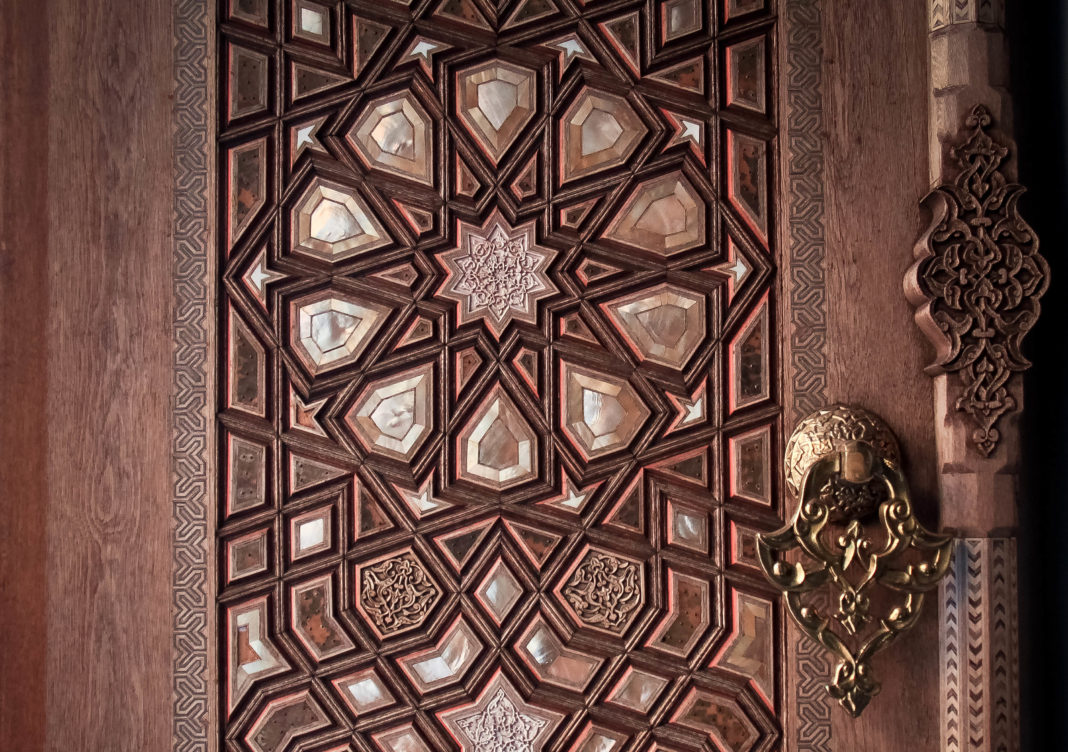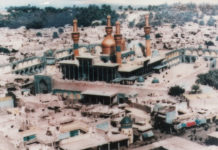Sayyid Saʿīd al-Ḥakīm
The following translated passages come from a larger work in Arabic by Sayyid Muḥammad Saʿīd al-Ḥakīm in which he addresses some of the main issues that surround the practice of referring to a jurist for legal issues (taqlīd).
Sayyid Muḥammad Saʿīd al-Ḥakīm is one of the prominent religious legal authorities (marājiʿ, s. marjīʿ) of our day and resides in Najaf, Iraq. He comes from a long line of religious authorities, including his grand uncle, Sayyid Muḥsin al-Ḥakīm, who was the primary marjiʿ of the Shīʿah world after the death of Sayyid Ḥusayn Burūjirdī in 1961.
The book, al-Marjiʿiyyah al-dīniyyah, attempts to answer many of the questions and misconceptions about taqlīd: the necessity of this practice, the proper method for choosing one’s marjiʿ, the necessary conditions of a marjiʿ, and the responsibilities of both the marjiʿ and the muqallid, or one who refers to a legal authority. The book is presented in question-and-answer format and is distinguished from introductory jurisprudence (fiqh) by referring to some of the reasons for the particular issue addressed—whether they be relevant narrated traditions (aḥadīth), historical evidence, or otherwise—in an attempt to answer and reconcile for the reader some of these seemingly ubiquitous questions about the practice of taqlīd. We hope that, God-willing, this will be the first installment in a series of such translations.
˚ ˚ ˚
Question:
When did the Shīʿah begin the practice of referring to scholars for taqlīd? Was this tradition present among the Shīʿah before the Occultation, i.e. when the Imāms were present, or even during the Lesser Occultation? Or did it begin afterward?
Answer:
All praise is due to God, the Lord of the Realms. Peace and blessings be upon our master and our prophet, Muḥammad, and upon his pure progeny. And may God’s curses be upon all their enemies until Judgment Day.
The practice of referring to scholars and inquiring about religious laws (al-aḥkām al-sharʿiyyah) is a tradition that existed from the earliest periods among the Shīʿah and the general Muslim community; and in every period, there were a group of people who would issue verdicts on these issues.
In fact the texts are replete with instances where Shīʿī scholars confront these issues of religious law [before the Occultation] such as in the case of Abān ibn Taghlib, about whom Shaykh al-Ṭūsī, after many words of praise, says, “[Imām] al-Bāqir said to him, ‘Sit in the masjid of Madīnah and give religious verdicts to the people. For from among my Shīʿah, I would love the likes of you to be seen.’ And thus he sat [in the masjid and gave verdicts].” [1]
There is the example of Muʿādh ibn Muslim al-Naḥwī, about whom the following is narrated:
Imām al-Ṣādiq once said, “I have heard that you sit in the great masjid and give religious verdicts to the people.” I [Muʿādh] responded, “Yes, and I intended to ask you about this before I departed. I sit in the masjid and when a person comes asking me about an issue, if I know that person opposes you, I inform him of what they (the opponents) say. If another comes to me and I know he is devoted to you, I inform him of what has been narrated from you. And if yet another comes to me and I know not who he is, I tell him, ‘This person states this, and that individual narrates that,’ and I interject your views in-between (my comments).’” The Imām then told me, “Do this, for verily I too do this.” [2]
However, Shīʿī jurisprudence (fiqh) and its scholars were not distinct and independent in the earliest periods because of the many calamities and difficulties that befell the Shīʿī community in those periods. Indeed such difficulties caused the community to primarily focus on political issues, as they prioritized striving to acquire political power for the Ahl al-Bayt. They were primarily concerned with having the Ahl al-Bayt assume power, without seeking to clarify the key differences in fiqh between the Ahl al-Bayt and others. At times, the (early) Shīʿah would even request religious verdicts and adopt laws from the scholars of the general community, being unaware of the difference between these verdicts and laws and those of the Ahl al-Bayt.
But after the tragedy of Ṭaff [Karbala], any hope that the Ahl al-Bayt would acquire political dominion was dashed for at least the foreseeable future. This event, on the one hand, made manifest the purity of the Ahl al-Bayt, and evinced their rights [upon the community]. On the other hand, it laid bare the signs of misguidance and falsehood lurking in the larger Muslim polity. Thus, the Shīʿah turned to the Imāms from among the Ahl al-Bayt, so that they could acquire their religion from them in terms of both belief and law, and thus break with and avoid leaders other than them.
For the Imāms, this was a ripe opportunity and an appropriate moment to disseminate their knowledge and instruct the Shīʿah in all aspects of faith, whether regarding religious belief or practice, such as the criteria for love and devotion, or dislike and dissociation. The Imāms strove to develop a religious worldview for their Shīʿah from which the Shīʿah could support and broadcast the Imāms’ teachings; and through which the Shīʿah would become independent of others.
And it seems that Imām al-Bāqir was referring to this issue in his testament to Imām al-Ṣādiq. In an authentic narration (ṣaḥīḥ) by Ḥishām ibn Sālim, it is reported from [Imām al-Ṣādiq] who said, “When my father was near death, he said [to me], ‘Oh Jaʿfar, I enjoin you to goodness towards my companions.’ I replied, “May I be your sacrifice! By God, I will indeed leave them such that one of them will be in a city and will not need to ask another [for his religious questions].” [3]
And he indeed fulfilled that promise. In turn, the Shīʿah began to seek out and follow their scholars, with a group of those scholars being referred to for religious verdicts, and with these scholars being in line with the guidance of the Imāms.
In an authentic narration by Shuʿayb al-ʿAqarqūfī, it is narrated, “I said to [Imām al-Ṣādiq], ‘We may need to inquire about some issues. Who should we ask our questions to? He said, ‘Go to al-Asadī,’ referring to Abū Baṣīr.” [4]
And in another authentic narration, ‘Abdullah ibn Abī Yaʿfūr states, “I said to [Imām al-Ṣādiq], ‘Indeed, I will not be able to meet you at every time [of need], and I will not be able to come to you. If one of our companions comes to me and asks me something, I may not have the answers to all his questions.’ He responded, ‘What has prevented you from Muḥammad ibn Muslim al-Thaqafī? He has indeed heard (and learned) from my father and was honored by him.” [5]
There are narrations about referring to other individual scholars, such as al-Ḥārith ibn al-Mughīrah, Zurārah ibn Aʿyan, al-Mufaḍḍal ibn ʿUmar, al-ʿAmrī and his son, and many others—too many to be enumerated here. [6]
The Imāms also made general injunctions to refer to the scholars of the community without exclusively mentioning a particular individual. Such injunctions can be found in many different texts, such as the blessed and famous letter of the awaited Imām, the Imām of our age, may Allah hasten his reappearance—a letter that was received near the beginning or middle of the Lesser Occultation. [7]
In addition, the Imāms perfected Shīʿī fiqh and made the community independent of other sources as mentioned in a reliable narration (muwaththaq) from Muḥammad ibn Ḥakīm… [8] And it is narrated from the book of Imām al-Hādī, by Aḥmad ibn Ḥātim and his brother… [9]
And indeed, at times, scholars from other schools would refer to these scholars when faced with difficult problems. The other [non-Shīʿī] scholars knew that the Shīʿī scholars had derived their knowledge from a pure spring that never runs dry. [10]
The Imāms had also strongly emphasized the writing of knowledge and aḥadīth. This was to preserve knowledge and to allow the people to benefit from that knowledge, especially during the occultation, where the people would have no recourse other than to texts of aḥādīth [for their religion]. In this regard, it is narrated in the Muʿtabar of Abū Basir, “I heard [Imām al-Ṣādiq] state, “Write, for you will indeed not be safeguarded unless you write.” [11]
And a reliable narration by ʿUbayd ibn Zurārah states, “[Imām al-Ṣādiq] once said, ‘Safeguard your books, for you will come to need them.’” [12] There is also a narration from al-Mufaḍḍal ibn ʿUmar in this regard. [13]
Thus, the Shīʿī jurists began to write books on religious laws and injunctions for the people to abide by, many of which resembled modern treatises on religious practices. Among the books of this genre that are reported to us include: Yawm wa laylah (One Day and One Night) of Yūnus ibn ʿAbd al-Raḥmān, one of the companions of Imām al-Riḍā. This text is praised in numerous sources and endorsed to be acted upon. [14] Then there is the book, known as al-Taʾdīb by Yūnus’ student, Aḥmad ibn ʿAbdullāh ibn Mahrān, also known as ibn Khānabah. There is also the treatise by ʿAlī ibn Bābawayh al-Qummī, the father of al-Ṣadūq, who died during the Lesser Occultation. And the book al-Mutamassik bi-ḥabl āl al-rasūl, by Ibn Abī ʿAqīl al-ʿUmānī, who was al-Qummī’s contemporary. And the book al-Mukhtaṣar al-Aḥmadī fī al-fiqh al-Muḥammadī, by Ibn al-Junayd, who was close to the former two.
The book Man lā yaḥḍuruh al-faqīh, written by al-Ṣadūq in the beginning of the Greater Occultation, and comprising his own religious verdicts, is entirely a treatise on religious practices, written for one who cannot easily access a jurist.
Each subsequent generation of scholars continued the tradition of these treatises on religious practices, such as Shaykh al-Mufīd’s al-Muqniʿah, Sayyid al-Murtaḍā’s Jumal al-ʿilm wa al-ʿamal, Shaykh al-Ṭūsī’s al-Nihāyah fī mujarrad al-fiqh wa al-fatwā—may God sanctify all their purified souls—and many other texts too numerous to enumerate here.
[1] al-Fihrist, 17.
[2] Wasāʾil al-shīʿah, 18, 108
[3] al-Kāfī, 1, 306.
[4] Ikhtiyār maʿrifah al-rijāl, 1, 400.
[5] Wasāʾil, 18, 105. Also see ibid.,18, 106; 18, 107.
[6] See Rijāl al-Kashshi, 357, 483, 595; and Rijāl al-Ṭūsī, 509; Waṣāʾil, 18, 103-111.
[7] Wasāʾil, 18, 101.
[8] Ibid., 18, 61.
[9] Ibid., 18, 110.
[10] See the reliable (muwaththaq) tradition by Muḥammad ibn Muslim in Rijāl al-Kashshī, 146. And the narration of al-Sayyārī, Wasāʾil, 12, 410.
[11] Ibid., 18, 56.
[12] Ibid.
[13] Ibid.
[14] Ibid., 18:71-2.




